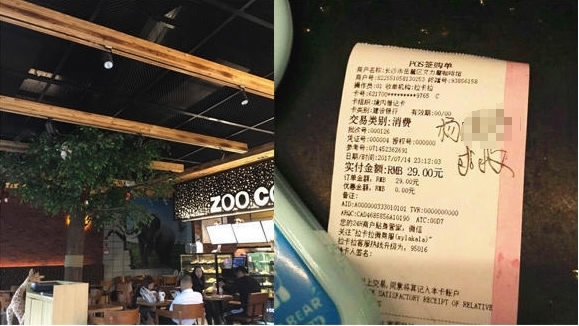
China
14:47, 17-Jul-2017
Woman escapes pyramid scheme with SOS message on cafe receipt

Can you imagine finding a simple receipt with a message scrawled on it from someone desperately trying to save themselves from danger?
A university student from Nanning, south China’s Guangxi Zhuang Autonomous Region, found herself stuck in a pyramid selling scheme, and chose to leave an SOS on a coffee shop receipt in a bid to get help. Her unusual call for help saw her praised online for her quick thinking and resourcefulness.
The student, surnamed Yang, came to the local coffee shop in Changsha, central China’s Hunan Province on Friday, accompanied by two women and a man.
She then immediately went to the counter asking shop manager Peng Huaixin if there was a washroom, before sitting down with her companions.
The shop manager, however, failed to recognize her plea for help disguised in her inquiry.
“She said ‘help’ in an extremely quiet voice when ordering the drinks, but I did not hear it at all,” Peng told local media icswb.com, adding the student later resorted to the receipt as a final attempt at a distress signal.

Yang wrote "SOS" in Chinese along with her name on the receipt. /icswb.com Photo
Yang wrote "SOS" in Chinese along with her name on the receipt. /icswb.com Photo
On paying the bill when leaving, Yang wrote “SOS” in Chinese along with her name on the receipt. When he saw it, Peng reported the case to the shop owner who asked Peng to call police.
Yang, who was later identified by local police as a university student coaxed from Nanning to Changsha by the pyramid scheme through the Internet, was under the control of the three suspects throughout her stay in Changsha while being pressured to make an investment, according to the preliminary investigation.
She was taken back to her family following the incident, with the three suspects still in detention for investigation, local police reported.
The case attracted widespread attention online, as thousands of netizens praised the quick-witted student as well as the shop manager, who offered timely help instead of turning her back on someone in need.
“How smart is the university student! We should learn from her,” @momo6254856416 commented on Weibo. He also called for strengthened efforts from the government to address the growing number of pyramid selling organizations.

Peng Huaixin, manager of the coffee shop. /icswb.com Photo
Peng Huaixin, manager of the coffee shop. /icswb.com Photo
“I must give a thumbs-up to the kind-hearted shop manager who provided help despite the possibility of getting into trouble,” said another netizen, adding if she were the shop manager, she would not have been able to recognize the student’s handwritten message at all.
Pyramid schemes, which are infamous for deceptive fund-raising and relentless pressure on recruited members, run on an outlawed multi-level business model that makes illegal profits by entrapping others into the scheme, rather than making investments or selling products.
In May 2015, a pyramid scheme operated through WeChat, China’s most popular instant messaging app, was busted by police in Nanjing, east China’s Jiangsu Province, with its mastermind sentenced to prison for eight years and fined 10,000 yuan (1,477 US dollars).

46 members from a local pyramid selling scheme were arrested last Tuesday by police in Beihai, south China's Guangxi Zhuang Autonomous Region. /Chinanews Photo
46 members from a local pyramid selling scheme were arrested last Tuesday by police in Beihai, south China's Guangxi Zhuang Autonomous Region. /Chinanews Photo
Altogether, 46 members from a pyramid scheme in Beihai, also in Guangxi, were arrested last Tuesday amid a police crackdown on such shady fundraising activities.

SITEMAP
Copyright © 2018 CGTN. Beijing ICP prepared NO.16065310-3
Copyright © 2018 CGTN. Beijing ICP prepared NO.16065310-3